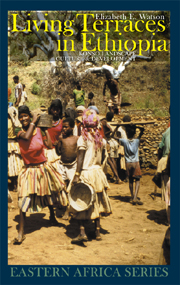Book contents
- Frontmatter
- Contents
- List of Photographs
- List of Maps, Tables & Figures
- Acknowledgements
- Foreword
- Introduction: Konso Landscape, Culture & Development
- 1 Konso Intensive Indigenous Agriculture
- 2 Social Life of Agriculture
- 3 Ritual Life of Agriculture
- 4 Political Life of Agriculture
- 5 Modernity & Christianity
- 6 Revolutionary State
- 7 Ethnic Decentralization & Self-determination
- Conclusion: Landscape, Meaning & Development
- References
- Index
4 - Political Life of Agriculture
Published online by Cambridge University Press: 12 September 2012
- Frontmatter
- Contents
- List of Photographs
- List of Maps, Tables & Figures
- Acknowledgements
- Foreword
- Introduction: Konso Landscape, Culture & Development
- 1 Konso Intensive Indigenous Agriculture
- 2 Social Life of Agriculture
- 3 Ritual Life of Agriculture
- 4 Political Life of Agriculture
- 5 Modernity & Christianity
- 6 Revolutionary State
- 7 Ethnic Decentralization & Self-determination
- Conclusion: Landscape, Meaning & Development
- References
- Index
Summary
In this chapter, the study of the poqallas is developed further to examine more critically the nature of the power relations that exist between the poqallas and others. The previous chapters have demonstrated that the poqallas play a role in turning the stony grounds into fertile ones, which means that they exist as a form of institution central to the intensive agriculture. Development organizations have ‘discovered’ the importance of the institutional dimensions of environmental management in recent years, and indigenous institutions are seen as particularly valuable resources because they are considered to be already existing institutions that can potentially be harnessed for environment and development ends. These approaches to working with indigenous institutions tend to focus on identifying and illustrating the role that they play in environmental management. In arguing for these institutions' positive role, there is little time to think more critically about the nature of the power relations between these institutions and the others in the community. If anything, development organizations normally assume that the institutions are the legitimate representatives of the community and working for the common good.
This chapter argues that development organizations need to think more carefully about the nature of the power of the institutions with which they are working. For example, are they simply representatives of the community among whom they live and institutions that provide a coping mechanism for the poor and sustain the landesque capital?
- Type
- Chapter
- Information
- Living Terraces in EthiopiaKonso Landscape, Culture and Development, pp. 111 - 146Publisher: Boydell & BrewerPrint publication year: 2009



